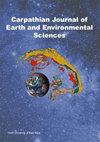利用污水污泥和污水干湿法改善冻融盐碱土的水力特性
IF 0.9
4区 环境科学与生态学
Q4 ENVIRONMENTAL SCIENCES
Carpathian Journal of Earth and Environmental Sciences
Pub Date : 2023-01-25
DOI:10.26471/cjees/2023/018/239
引用次数: 0
摘要
为了保护寒冷地区弱团聚盐碱土免受冻融事件的负面影响,需要采取土壤改良措施。通过添加污水污泥和对废水进行干湿处理来改善这些土壤是一种实际应用,因为随着有机质的增加,聚集会增加。因此,进行了一项实验室试验,以确定三种稳定污泥剂量(0、50和100 Mg ha−1)、两次冻融循环(5次和10次)、两次干湿间隔(4天和8天)和两种水类型(淡水和再生废水)对土壤特性的影响。确定了冻融对有机质和团聚体稳定性的负面影响。然而,污水污泥在增加有机质、骨料稳定性、盐度、交换性K和Ca+Mg含量、阳离子交换容量(CEC)的同时,还有助于降低pH、交换性Na、CaCO3和交换性钠百分比(ESP),从而提高田间容量和水力导电性。8天的干湿间隔和废水处理也能改善有机物质的含量。因此,可以得出结论,水力性能的改善可归因于污水污泥土壤中有机质含量的增加,从而获得更好的团聚体稳定性。长时间的干湿间隔和废水回收也能促进良好的效果。然而,在冻融事件暴露地区的外部野外条件下,通过提出的处理方法来改进研究结果将提供更多的实际应用。本文章由计算机程序翻译,如有差异,请以英文原文为准。
IMPROVEMENT OF THE HYDRAULIC PROPERTIES OF SALINE-SODIC SOIL EXPOSED TO FREEZING-THAWING USING SEWAGE SLUDGE AND WETTING-DRYING PROCESS WITH WASTEWATER
Soil improvement practices are needed to protect weakly aggregated saline-sodic soils in cold regions from the negative effects of freezing-thawing events. Amelioration of these soils by adding sewage sludge and applying wetting–drying process with wastewater can be a practical application due to aggregation to be increased with increase in organic matter. Therefore, a laboratory experiment has been conducted to determine the effects on soil properties with three stabilized sewage sludge doses (0, 50, 100 Mg ha−1), two freeze-thaw cycles (5 and 10 times), two wetting-drying intervals (4 and 8 days) and two water types (freshwater and recycled wastewater). The negative effects of freezing-thawing on organic matter and aggregate stability were determined. However, while sewage sludge increased organic matter, aggregate stability, salinity, exchangeable K and Ca+Mg contents, cation exchange capacity (CEC), it was instrumental in inducing a lower pH, exchangeable Na, CaCO3 and exchangeable sodium percentage (ESP), and thus improved field capacity and hydraulic conductivity. Wetting-drying with 8-day intervals and wastewater improved organic matter also. Therefore, it could be concluded that the improvement of hydraulic properties can be attributed to achieving better aggregate stability with increased organic matter in soil from sewage sludge. Long intervals of wetting-drying and recycled wastewater can promote good results as well. However, improving the findings with the proposed treatments in the outer field conditions of the regions exposed to freezing-thawing events will provide more practical use.
求助全文
通过发布文献求助,成功后即可免费获取论文全文。
去求助
来源期刊
CiteScore
2.30
自引率
25.00%
发文量
42
审稿时长
12-24 weeks
期刊介绍:
The publishing of CARPATHIAN JOURNAL of EARTH and ENVIRONMENTAL SCIENCES has started in 2006. The regularity of this magazine is biannual. The magazine will publish scientific works, in international purposes, in different areas of research, such as : geology, geography, environmental sciences, the environmental pollution and protection, environmental chemistry and physic, environmental biodegradation, climatic exchanges, fighting against natural disasters, protected areas, soil degradation, water quality, water supplies, sustainable development.

 求助内容:
求助内容: 应助结果提醒方式:
应助结果提醒方式:


